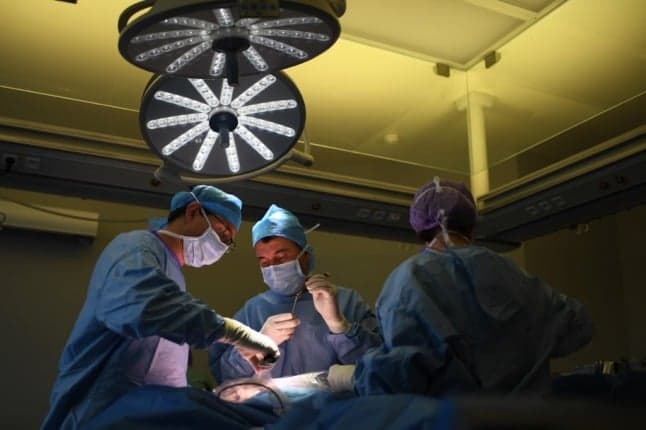What are the different types of medical specialists called in Spanish?

You may already know that the Spanish word for doctor is either ‘médico’ or ‘doctor/a’, that a nurse is an ‘enfermero/a’ and that a receptionist is a ‘recepcionista’, but what about all the other medical specialists?
Because of their common Latin root in both English and Spanish, most medical titles can be easily recognised by anglophones learning Spanish. Not all of them, however.
Here we’ll go over some of the medical specialties and how to call them in Spanish.
A couple of pointers before we start. Remember that the syllable that has the accent on the vowel is the one you stress in Spanish.
Also, in Spanish a “g” followed by an a,o or u is pronounced like “gh” sound like ghost or get, but a “g” followed by e or i is pronounced with a “ha” sound like hat or head.
And as most Spanish professions differentiate the person’s gender, the masculine article is “el” and the noun usually ends in “o” and the feminine article is “la” and most often ends in “a”. There are some exceptions such as médico (doctor) where the article changes but the noun always ends in "o".
Here is a list of the majority of medical specialists and health professionals and how they are referred to in Spain.
Surgeon: el cirujano, la cirujana. Depending on the type of surgeon it can be cirujano cardiovascular, pediátrico etc or in the case of a neurosurgeon it’s a neurocirujano/a.
Anaethetist (anaesthesia): el anestesiólogo, la anestesióloga
Cardiologist (heart): el cardiólogo, la cardióloga
Dental surgeon: el odontólogo/la odontóloga
Dermatologist (skin): el dermatólogo, la dermatóloga
Endocrinologist (hormones): el endocrinólogo, la endocrinóloga
Gastroenterologist (stomach): el gastroenterólogo, la gastroenterólogo. Most people instead el/la médico digestivo
Gynaecologist (female reproductive system): el ginecólogo, la ginecóloga
Occupational therapist: el terapeuta ocupacional, la terapeuta ocupacional
Ophthalmologist (eyes): el oftalmólogo, la oftalmóloga
Oncologist (cancer): el oncólogo, la oncóloga
Orthopaedist (musculoskeletal): el ortopedista, la ortopedista
Orthopaedic surgeon: el traumatólogo, la traumatóloga
Otolaryngologist (ear, nose, and throat - ENT): el otorrinolaringólogo, la otorrinolaringóloga. Often shortened to el/la otorrino.
Paediatrician (children): el pediatra, la pediatra
Podiatrist or chiropodist (feet): el podólogo, la podóloga
Physiotherapist (injury, illness or disability therapy): el fisioterapeuta, la fisioterapeuta. Often shortened to el/la fisio.
Psychologist (mental health): el (p)sicólogo, la (p)sicóloga
Psychiatrist (mental health): el psiquiatra, la psiquiatra
Pulmonologist (lungs): el neumólogo, la neumóloga
Radiologist (X-rays, MRI, CT): el radiólogo, la radióloga
Rheumatologist (arthritis and other diseases of the joints, muscles, and bones): el reumatólogo, la reumatóloga
Speech therapist: el logopeda, la logopeda
Urologist (urinary system): el urólogo, la uróloga
READ ALSO:
Comments
See Also
Because of their common Latin root in both English and Spanish, most medical titles can be easily recognised by anglophones learning Spanish. Not all of them, however.
Here we’ll go over some of the medical specialties and how to call them in Spanish.
A couple of pointers before we start. Remember that the syllable that has the accent on the vowel is the one you stress in Spanish.
Also, in Spanish a “g” followed by an a,o or u is pronounced like “gh” sound like ghost or get, but a “g” followed by e or i is pronounced with a “ha” sound like hat or head.
And as most Spanish professions differentiate the person’s gender, the masculine article is “el” and the noun usually ends in “o” and the feminine article is “la” and most often ends in “a”. There are some exceptions such as médico (doctor) where the article changes but the noun always ends in "o".
Here is a list of the majority of medical specialists and health professionals and how they are referred to in Spain.
Surgeon: el cirujano, la cirujana. Depending on the type of surgeon it can be cirujano cardiovascular, pediátrico etc or in the case of a neurosurgeon it’s a neurocirujano/a.
Anaethetist (anaesthesia): el anestesiólogo, la anestesióloga
Cardiologist (heart): el cardiólogo, la cardióloga
Dental surgeon: el odontólogo/la odontóloga
Dermatologist (skin): el dermatólogo, la dermatóloga
Endocrinologist (hormones): el endocrinólogo, la endocrinóloga
Gastroenterologist (stomach): el gastroenterólogo, la gastroenterólogo. Most people instead el/la médico digestivo
Gynaecologist (female reproductive system): el ginecólogo, la ginecóloga
Occupational therapist: el terapeuta ocupacional, la terapeuta ocupacional
Ophthalmologist (eyes): el oftalmólogo, la oftalmóloga
Oncologist (cancer): el oncólogo, la oncóloga
Orthopaedist (musculoskeletal): el ortopedista, la ortopedista
Orthopaedic surgeon: el traumatólogo, la traumatóloga
Otolaryngologist (ear, nose, and throat - ENT): el otorrinolaringólogo, la otorrinolaringóloga. Often shortened to el/la otorrino.
Paediatrician (children): el pediatra, la pediatra
Podiatrist or chiropodist (feet): el podólogo, la podóloga
Physiotherapist (injury, illness or disability therapy): el fisioterapeuta, la fisioterapeuta. Often shortened to el/la fisio.
Psychologist (mental health): el (p)sicólogo, la (p)sicóloga
Psychiatrist (mental health): el psiquiatra, la psiquiatra
Pulmonologist (lungs): el neumólogo, la neumóloga
Radiologist (X-rays, MRI, CT): el radiólogo, la radióloga
Rheumatologist (arthritis and other diseases of the joints, muscles, and bones): el reumatólogo, la reumatóloga
Speech therapist: el logopeda, la logopeda
Urologist (urinary system): el urólogo, la uróloga
READ ALSO:
Join the conversation in our comments section below. Share your own views and experience and if you have a question or suggestion for our journalists then email us at [email protected].
Please keep comments civil, constructive and on topic – and make sure to read our terms of use before getting involved.
Please log in here to leave a comment.